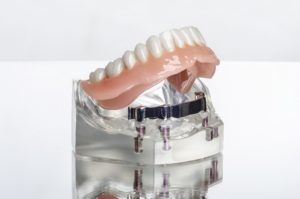 If you’re ready to invest in the next best thing to real teeth, dental implants are the solution for you. Implant dentures replace both the tooth roots and the crowns, so your new teeth will have the support of your jawbone. You’ll never have to worry about slipping or irritation again, but that doesn’t mean you can chomp down on a juicy hamburger right away. Here are a few things you can expect when transitioning from traditional dentures to dental implants.
If you’re ready to invest in the next best thing to real teeth, dental implants are the solution for you. Implant dentures replace both the tooth roots and the crowns, so your new teeth will have the support of your jawbone. You’ll never have to worry about slipping or irritation again, but that doesn’t mean you can chomp down on a juicy hamburger right away. Here are a few things you can expect when transitioning from traditional dentures to dental implants.
Your Mouth Will Be Sore
You’ll require oral surgery to place implant posts in your jawbone to serve as new tooth roots. After the effects of any numbing medications or sedatives wear off, you can experience tenderness, swelling, and bruising, which will improve in 3-4 days. Manage any discomfort with an over-the-counter pain reliever and apply a cold compress.
You’ll Have Diet Restrictions
Although you can’t wait to try out your new teeth, you’ll have to stick to a liquid diet for about 2 weeks. After that time, eat foods that require minimal chewing. Your jawbone must fuse to the implant posts through a process called osseointegration. If too much pressure is put on your implants, your bone won’t heal correctly, which will cause your new smile to fail.
Your Words May Sound Slurred
It’s easier to speak with implant dentures than traditional prosthetics because your teeth won’t move around in your mouth. However, they will feel foreign at first, which can make your words sound slurred. Thankfully, it will be a short-term issue with practice. Singing and reading out loud will have you speaking clearly in no time.
Don’t Forget to Brush and Floss
Dental implants can’t get cavities, but you must brush and floss your teeth to remove food debris and plaque. Good oral hygiene is essential for keeping peri-implantitis at bay. The preventable infection is like gum disease and can cause dental implant failure. Brush twice a day, floss nightly, and use an antimicrobial mouthwash.
Visit Your Dentist Every 6 Months
Dental implants have over a 95% success rate and can last for 30 years or more. Besides brushing and flossing, schedule a cleaning and checkup every 6 months to safeguard your investment.
It may take time to adjust to your new smile, but you might soon forget your dental implants aren’t your real teeth. Whether laughing with a friend, enjoying a steak, or smiling for a picture, you’ll never have to worry about your dentures falling out.
About Dr. Shue Her
Dr. Her earned his dental degree at the University of Minnesota School of Dentistry and has completed advanced training in many specialties, including dental implants and sedation dentistry. He is affiliated with many prestigious organizations, including the American Dental Association. Request an appointment through his website or call (470) 228-4977.
